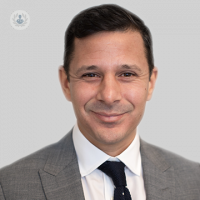Should I have laser eye or lens replacement surgery?
Autore:What is refractive surgery?
Refractive surgery refers to a group of procedures that are designed to improve or correct vision for patients who are glasses dependent. Those patients may be short-sighted, long-sighted or have astigmatism, which is where the shape of the front of the eye, the cornea, is a little irregular in such a way that they need some correction in their glasses to improve the vision. It also incorporates a group of patients who may find that they are getting a blurred vision as they get older and start to need reading glasses.
Refractive surgery is generally regarded as being something where you operate on the cornea and most people have heard of LASIK, which is very commonly performed on patients who are younger and want to get rid of their glasses for distance.
LASIK is one procedure of a great many and in fact, refractive procedures can involve surgery to the cornea and also inside the eye. In recent years, the advance of technology such as intraocular lenses, which allows different degrees of focus, have come on the scene and really expanded the range of options available to those sorts of patients. But for younger patients who may have very high glasses prescriptions, there are other options where one might, for example, put a lens inside the eye in addition to their natural lens so that they maintain accommodation and the ability to focus the near and distance.
Laser eye surgery
Laser eye surgery involves reshaping the cornea. The cornea is the clear window at the front of the eye that actually does most of the focusing power of the eye. For younger patients who are maybe short-sighted or long-sighted, laser eye surgery is used to reshape the cornea and refocus the light at the back of the eye. That’s being done for a number of years now and is generally a very safe procedure and very effective for that category of patients. It is also used in older patients, but the downside is that as we get older, the eye changes. So the ability to focus for near-sight diminishes in our forties and fifties. Laser eye surgery that has been conductive when you were younger does not necessarily provide that near vision that you need when you are older.
Lens replacement surgery
The alternative is to either reshape the cornea, to refocus the light for near for one eye or it may involve going inside the eye to remove the lens that is no longer able to provide that near vision and replacing it with a clear plastic lens that maybe will give you a degree of what we call multifocality. That means that the lens will provide some distance vision, some intermediate vision, for maybe looking at your computer, and maybe some near vision so that you can read without your glasses. Of course, going inside the eye does involve a degree of risk but with modern cataract surgery techniques and an experienced surgeon, the risks to the eye are extremely low.
Should I have laser eye or lens replacement surgery?
In short, laser eye surgery can be used at any age, but generally is more effective and simpler to perform in patients who are younger where the results of surgery are such that they will still retain this ability to accommodate for near that is lost as we get older. And as we get older, maybe it's better to move to a procedure where we can remove the lens that is no longer able to provide that near vision and replace it with the lens to give you a degree of flexibility in terms of achieving glasses independence.
How to choose an ophthalmologist for eye surgery
Every eye is different and every patient is different. Their needs are different. With the huge array of options available to patients, now, it’s no wonder that the business of trying to choose a solution for you is often very fraught and confusing. I suggest that you find a surgeon that you trust and that you are happy with and that has the experience to manage and guide you through the process of coming to a solution to your eye problem. They also need a skill set that permits them to handle any complications that might occur as a result of the surgery because most complications, if handled effectively and corrected correctly, can result in a good outcome.



